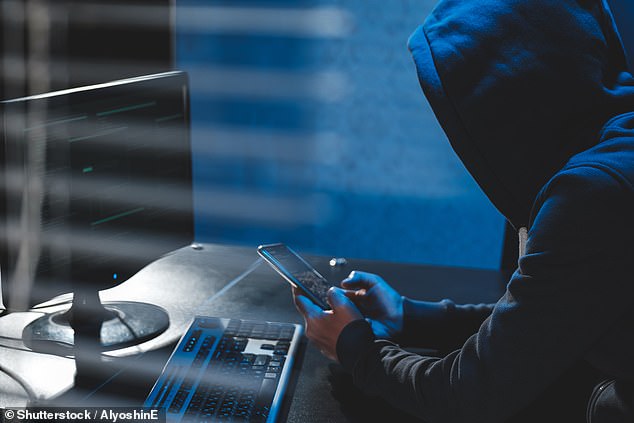
Howard Kosky discovered his mother Shirley had fallen victim to a befriending scam
When Howard Kosky cleared his late mother’s house last year, he found an envelope of used Apple vouchers worth thousands of pounds.
As he looked through, he found that they were all in £250 and £500 denominations amounting to around £13,000.
At the same time, when his mother’s estate went into probate, Howard, who lives in St Albans, received her bank statements and found a worrying number of withdrawals and bank transfers.
Sadly, the vouchers and payments weren’t made to friends or family, but rather scammers who preyed on and cruelly took advantage of her loneliness in the two years before her death.
Howard’s mother, Shirley, used Facebook on her iPad to chat with her friends. But six months after Howard’s father passed away in October 2020, she started to use friendship websites.
‘Occasionally she’d speak to me and say “I’ve met this man, how would you feel” and I’d say “Well mum, if you’re happy I’m happy”.’
‘But my suspicions were there. I’d ask his name, where he lives and she’d often say he’s in America.
‘I remember going out for lunch with mum and she said “how would you feel if I met someone”… she showed me a picture of this guy who was in his early 50s and he was better looking than George Clooney.
‘With all due respect to mum, she was knocking on 80…
‘I tried to say to her “mum it’s a scam” she was almost offended by my cynicism.’
Howard’s story is not an isolated one, as romance scammers continue to fleece people across the country – and warnings from family members and friends are brushed aside.
‘The suspicions were raised when she said someone in America had asked her to transfer $3,000.’
He warned his mother not to move any money anywhere, but sadly she didn’t heed the warnings and lost £30,000 as a result.
‘Unfortunately on each occasion it followed a very similar pattern, and as much as I’d say to mum it’s a scam, it’s not a real person.
‘Ultimately I couldn’t chaperone or babysit my mother 24/7. She had control of her own money and her bank account, and unfortunately it comes across to me that the professional scammers know exactly what they’re doing.
‘Obviously they’re very literate and there are certain language and pinpoints in terms of how to try and get people to respond and react in a certain way. Unfortunately, mum fell victim to it.’

Romance and befriending scammers tend to target more vulnerable people
Howard would visit his mum every Sunday to spend time with her, but he was not aware she had transferred thousands of pounds to the scammers until after her death in June 2023.
As well as the £13,000 Apple vouchers, Shirley lost around £17,000 to the scammers through bank transfers.
‘I don’t know what was going through her mind, obviously loneliness. She’d been married to my father for over 50 years. They hadn’t spent a day apart.
‘That void in her life… I presume she was looking for that to be filled somehow.’
Howard is unsure whether Shirley might have realised it was a scam, but he hopes that if she had she wouldn’t have made the same mistake.
‘Who knows when someone is that lonely? All I could is ask mum each week how things were.
‘It’s not for me to access her phone and go through her messages.
‘It’s not my place to try to log in to all her different bits and pieces online, I just had to rely on what she told me.
‘The fact that on more than one occasion she met someone online who was in America, and after a number of weeks there was the question of “can you transfer me money” I would have hoped mum would have realised there’s a pattern these scammers have. Sadly that wasn’t to be the case.’
Although Howard had power of attorney, he says she was of sound mind and there was no need to monitor her.
‘Mum was mentally fit and healthy, so I felt no need to execute the power of attorney which I had. Because that’s taking away her freedoms and liberties. She was still driving, she was more than capable of living on her own.’
‘I felt a mixture of anger and frustration’
When Howard realised Shirley had been a victim of a number of scammers, he says he felt a ‘combination of sadness and anger.
‘It’s very sad that mum fell victim, that she had that level of loneliness after dad’s passing that she felt befriending someone… they’d get close if she transferred money. I don’t know.
‘The anger was towards the scammer and a little bit towards my mother, no matter how many times I told her not to do it, she still did it.
‘I know it’s not uncommon. It’s weird that no matter how many times you see programmes on television, or listen to radio, or read articles warning people… it feels as if among the lonely older age group… they are slightly more susceptible to being victims than perhaps others.’
It feels as if among the lonely older age group… they are slightly more susceptible to being victims
New figures from Wealth At Work show 14 per cent of the 6.2million adults who were fraud victims fell for a befriending or romance scam.
The research found that of those who had lost money to a financial scam, the average amount was over £1,000.
Despite Howard’s anger towards the scammers, he didn’t get in touch with the police to tell them what had happened.
‘There’s nothing you can do. I remember afterwards I got in touch the bank and asked how the transfers were made. The reality is, there’s no crime being committed. The cleverness of the scam is it’s not fraud, you’re not paying for something you’re not receiving.’
There was been a proliferation of authorised push payment (APP) scams when someone is tricked into sending money to a fraudster posing as someone else.
The latest figures show £239.3million was lost to APP scams in the first half of 2023. Meanwhile, UK Finance said yesterday that romance scams are at record levels, with victims losing £36.5million last year.
Often these scams are executed over months and tens of thousands of pounds are siphoned off, once trust is built.
It is also likely that the £36.5million figure is the tip of the iceberg, with many victims not reporting the crime, including the case above.
‘It’s an awkward one. You feel as if you’ve been defrauded and money’s moved, but the reality is [my mum] bought a load of vouchers. So do lots of other people.
‘It just so happened that these vouchers were given to someone that claimed to be someone and my mum was a victim of a scam.
‘It’s loneliness. All I can do is try and understand. She was with my dad for 50 years… as soon as dad is gone, there’s a massive void. I assume chatting to people online she felt was a way of having a friendship.’
Some links in this article may be affiliate links. If you click on them we may earn a small commission. That helps us fund This Is Money, and keep it free to use. We do not write articles to promote products. We do not allow any commercial relationship to affect our editorial independence.




